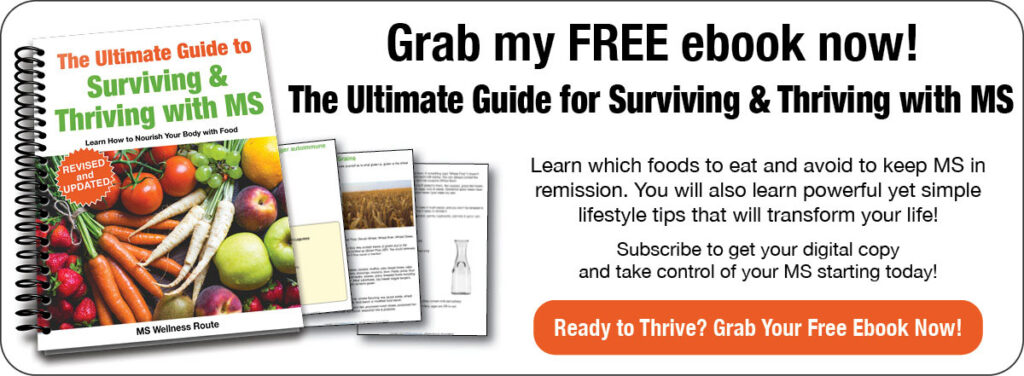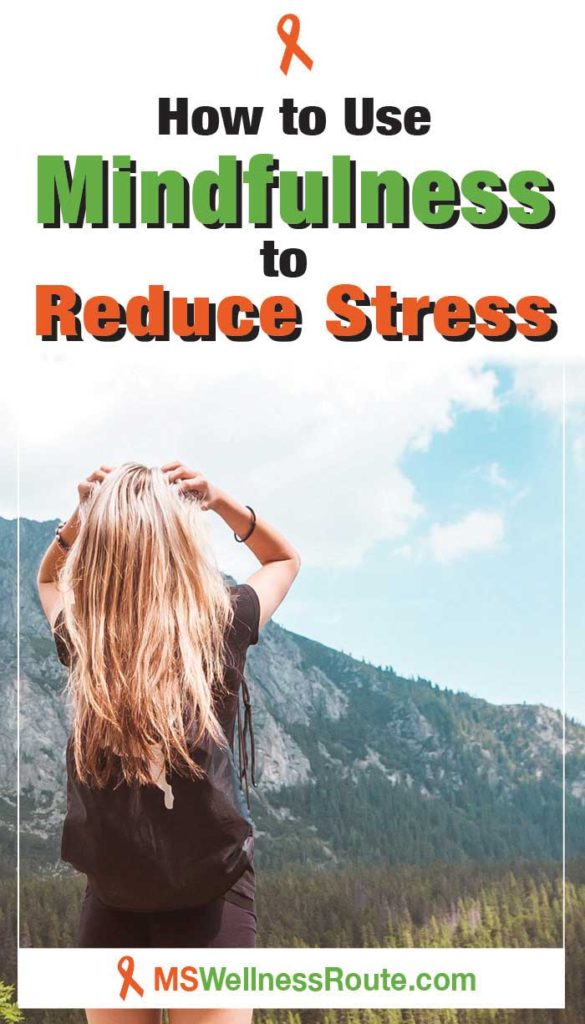Last Updated on November 27, 2023 by Cathy

Living with multiple sclerosis (MS) is tough. Sure there are the visible signs that other people see such as mobility issues. There are also invisible issues people with MS deal with every day that people don’t see. Such as numbness, tingling sensations, bladder issues, chronic fatigue, and brain fog.
Plus, MS is unpredictable. You never know when your next exacerbation (also known as a flare or attack) is going to happen. On top of your own health issues, you have to deal with all the ups and downs that life throws at you.
Get Your FREE Stress Journal
It’s hard enough raising a family and working but living with MS makes it 100 times harder. MS puts a strain on your finances, and makes you worry about the future, along with doctors and health insurance. Plus, doing all this when you don’t feel good – it’s overwhelming.
It is stressful living with MS.

Hearing the Diagnosis
It is devastating to hear those four words – ‘You Have Multiple Sclerosis.’ Even if you have experienced weird sensations for a while and suspected MS, it is still hard.
My doctor told me that I may have MS someday but it wasn’t until years later that I was officially diagnosed. Many years later our son got sick. That same day we found out he had type 1 diabetes. Either way, a diagnosis of an autoimmune disease is a traumatic experience.
Our teenage son had a really hard time adjusting to his new life. He now had to count carbohydrates every time he ate. It caused a lot of tension and stress for everyone in our household. We eventually got help by visiting a family counselor.
7 Stages of Grief

When you’re first diagnosed with an autoimmune disease there is a grieving process. It is known as the ‘7 Stages of Grief.’ It’s the same stage for someone who just lost a loved one. Although the order is different for everyone.
7 Stages of Grief:
- Shock & Denial
- Pain & Guilt
- Anger & Bargaining
- Depression, Reflection, and Loneliness
- Upward Turn (depression lifts)
- Reconstruction & Working Through (seeking solutions to manage your disease)
- Acceptance & Hope
When first diagnosed with an autoimmune disease, the stress and hopelessness is overwhelming. It is hard to imagine what your future will hold, especially when there is no cure. As you move through these stages of grief hopefully you get to the final stage – acceptance. That doesn’t mean you accept your diagnosis and you do nothing to slow it down. It means accepting who you are now.
Acceptance isn’t easy and it is something that you will need to work on. It took me years and it took my son years to accept the new challenges of life. For me, I hid my MS from most people at the same time trying to keep up with everyone. I always had an excuse as to why I was dragging my leg or why my body shut down in the heat while I was outside in the heat.
I tried to be the perfect employee, mom, and wife. Unfortunately, I was stretching myself thin in every direction even when I was feeling overwhelmed. Learning to eat a nutrient-dense diet was hard. But, managing my stress and anxiety was the hardest thing I had to learn.
You May Also Like To Read:
Need Some Stress Relief?
Relief From Stress With Exercise
What Is The Best Diet For MS?
Stress Plays a Big Role in MS
Acute stress is short-term, it’s part of being human. But, chronic stress, doesn’t go away, it keeps us at an elevated stress level. It causes digestive problems, lack of sleep, inflammation, heart disease, and mental disorders. Stress causes the body to release adrenaline and cortisol hormones. Telling the body to constantly take action. It also causes MS flares, which is the last thing you need.
Managing Stress
It took me years to get my stress under control. Between my highly demanding job and my teenage son with type 1 diabetes, it was very stressful. I eventually realized this wasn’t helping my health, instead it was making me worse.
Sometimes you need to take drastic measures to get your life under control. Whether it’s a high-pressure job, financial difficulties, or facing challenging relationships. Stress and depression suppress your immune system. Even though I loved my career (I worked at a newspaper), I decided it was too stressful so I left it. As far as my son goes, he’s now a thriving young man living on his own and taking care of his health.
Methods to Reduce Stress

It’s impossible to avoid stress altogether. It’s how you react to stress that will make a difference. I know everyone is different and everyone’s stress is different. Instead of focusing on the negative focus on what you can do.
Avoid what causes you stress and anything that is negative. The news, politics, the economy, and social media are very negative. There are a lot of negative people and lately it has gotten worse. Our brains aren’t designed to handle all this negativity.
Try some of these mindfulness techniques to reduce your stress levels:
- Avoid coffee (caffeine)
- Enjoy nature
- Go to bed early
- Put boundaries on negative people
- Quit watching drama TV/movies
- Smell the flowers
- Spend less time on your smartphone, computer, or tablet
- Stay off of social media
- Use essential oils
- Do light exercises
- Surround yourself with positive people
- Turn off the news
- Watch a funny movie
Unhappiness is contagious, don’t fall into this trap. If needed use an app like ‘Calm‘ to help you meditate and get a good night’s sleep. Use essential oils like Stress Relief, Lavender, Let It Go, or Tension Relief. Don’t be afraid to see a counselor, it really helped my family.
Learn to be mindful by being aware of your experience. Don’t overreact at the moment and let your emotions get out of control. Don’t be a victim by regretting the past or worrying about the future. – Chronic stress creates diseases.
“Do not dwell in the past, do not dream of the future, concentrate the mind on the present moment.”
– Buddha
Mindfulness to Reduce Stress
- Nourish your body with nutrient-dense foods
- Slow down when you eat and enjoy your food
- Meditate each day. Slowly take a deep breath in through your nose and out through you mouth like your warming your hands
- Focus on one task at a time and avoid multitasking
- Go outside and enjoy nature, enjoy the sights, smells, and sounds around you
- Practice gratitude and write down three things you are thankful for each day
- Take time out each day for yourself, do nothing but enjoy the peace
Using mindfulness to reduce stress takes work. Find what triggers your stress, look at your attitude and habits. If you are always dealing with heavy traffic leave a little early.
Don’t take on too many responsibilities – learn to say no. If you can’t change the stressor work on yourself by changing your attitude. Instead of getting upset about traffic listen to your favorite radio station and enjoy the music.
Many things are out of your control so focus on what you can do. Remember to take time out for fun and relaxation.
You can do this!

Stress Journal
Get the password for the library with the FREE Stress Journal here by filling out this form:
Want to remember this health tip? Pin it to your favorite Pinterest board!

How to Use Mindfulness to Reduce Stress





